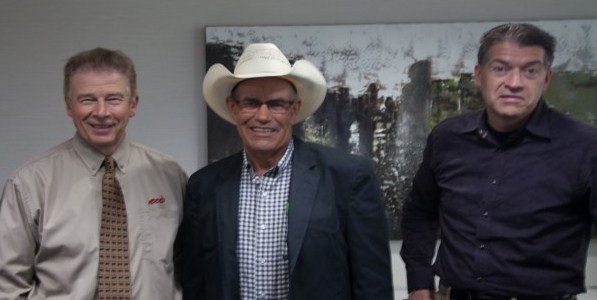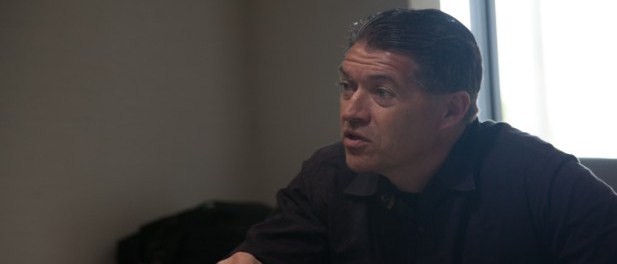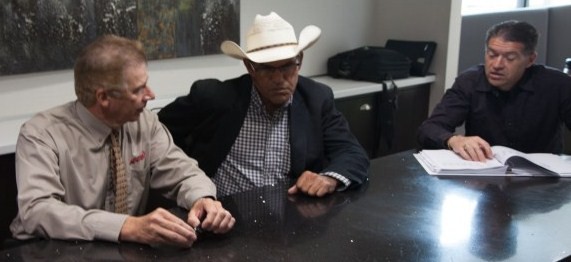A COOL Round Table Discussion with CCA

photo: CCA’s Dennis Laycraft, Dave Solverson, John Masswohl
When you attend the Canadian Cattlemen’s Association’s Semi-Annual Meeting, recently held in Winnipeg this past August, you get the feeling you’re at a major event with some of the biggest players in the cattle industry. Representatives from a multitude of organizations, producers, processors, media, and companies from across the country and the U.S. made the trip just to hear and/or participate in board meetings and committee presentations, where they could find a podium to share information and voice their opinions in general meetings ranging from foreign trade, sustainability, animal health, to domestic ag policy. And you know this is an invaluable meet for many members, and the industry on a whole, because CCA is the representative body that works tirelessly with Ottawa on matters of trade, marketing, policy, and of course country of origin labeling (mCOOL); CCA drew up the original legal opinion that kicked Ottawa into gear back in 2007
They are the voice of the Canadian Cattleman.
Needless to say, with so much crammed into three short days, time is limited for CCA’s executives. But I arrived with a mission of my own. And when I asked Gina Teel, CCA’s communications manager, if I could get president, Dave Solverson, executive vice-president, Dennis Laycraft, and director of government and international relations, John Masswohl, to sit down with me for a round table discussion on mCOOL prior to the WTO’s arbitration hearings in Geneva, she wasn’t sure it could happen. But Gina moved the mountain and did the impossible. The guys sat down with me for a frank discussion of where we’re at and what we hope will be the best outcome when the WTO final decision is made public this December. If Canada has pleaded their case during the arbitration hearing effectively, the WTO can in fact rule we can levy retaliatory tariffs of just over three billion dollars against the U.S across a very carefully chosen list of trade industries. This could spell the most significant trade disruption since NAFTA was signed.
Dave, Dennis, and John are as pleasant as they are informed, so they file in, firm handshakes all around, and get comfortable for our discussion.
CMB: So, Dave, you bring a real cattleman’s experience to the title of President for CCA.
Dave: Yeah, well, I grew up in it. My family had a small diary operation for years then a turn of fate with our barn burning down moved us into beef after that, raising seed stock and pure bread Hereford cattle in the seventies and eighties. By the time I was ready to venture out on my own, the downturn in the Alberta economy lowered land values and my brother and I bought up parcels of land and expanded the operation into a commercial business. Still going strong today.
CMB: So being a producer, did that drive your decision to run for president of CCA.
Dave: Well, to be honest, I really didn’t have any aspirations to be president. But I was “involved” prior by chairing the Animal Care and the Domestic Ag Policy committees. I served as Alberta’s representative to CAFTA – the Ag Food trade alliance, so through those positions I really got to see how influential and respected CCA was in the industry. So I was honored when they asked me to run four years ago now.
CMB: And John?
John: Well, ironically enough I don’t have a back ground in agriculture. I used to be with the Federal government for international trade and foreign affairs for a time. But mostly I’ve always worked in trade policy negotiations and was posted in the Canadian Embassy in Washington, serving as the Agriculture and Trade Counselor for a number of years. And now I’m in our Ottawa office as international relations liaison for CCA.
CMB: Okay. Dennis, how bout you?
Dennis: I grew up on a cattle ranch and worked in the cattle industry, even as a nutritionist for several years. Prior to joining CCA in 1990, I was the general manager of the Alberta Cattle Commission, which is now the Alberta Beef Producers. I was working pretty actively on the Alberta files. I was also instrumental in creating the Canada Beef Export Federation, and at that time was serving as the federation’s first executive director. After three years there I was hired on as general manager of CCA – the title was changed to Executive Vice President in ‘92.
CMB: Alright, so why don’t we dive right into the big question. Geneva and the arbitration hearing. I know you all have been involved with COOL since the beginning, so in your opinion what are you expecting out of the hearing? Dennis?
Dennis: Well, to date our estimates when you look at the trade impairment and market suppression costs for cattle and hogs is around 3 billion dollars. The U.S. has come up with an estimate of 90 million for both Canada and Mexico that purely looks at labeling costs within the states. They didn’t look at the additional costs of livestock segregation or market suppression, so by that their estimate is only a fraction of the overall. We know from all the past WTO hearings that the panel in Geneva have already accepted the methodology that Canada has put forward. So, on that basis we fully expect that there will be a significant number come out of arbitration, and then Canada can move forward, if necessary, and levy retaliatory tariffs against the U.S.
John: That pretty much says it.
Dave: Yeah, sure does. We should say as well that it’s been a tremendous leverage in having our government support us the way they have at the WTO and initiating this retaliatory strategy. They really drove the message out there that COOL has to be repealed.
John: Yes they did. It definitely got a lot of attention in Washington as to what is going on. And I am optimistic about the arbitration in Geneva, but we should keep in mind that regardless if we get the number we want from the WTO, Canada won’t be in a position to put any policies through with respect to the tariffs until after the election period now anyway.
CMB: Good point. So what the U.S. is essentially facing is the possibility of dealing with retaliatory tariffs on two fronts.
John: That’s right. And Mexico could start immediately because they don’t have an election constraint issue.
CMB: So, what was each of your reactions when the bill passed through the House of Representatives so fast with 300 votes for and 131 opposed – and it was so unilateral.
Dennis: Well, there’s that strong message to the senate we’re talking about.
Dave: Sure is. But you know, we always knew the House Ag Committee was strong for repeal, and that the real work to be done was going to be in the Senate.
Dennis: That’s right, we’re lucky that the elections swayed and the republicans took over control of the Senate, because what’s important about that is the house leaders of the Senate Ag committee are the majority, and now we’ve got two chairmen in Roberts and Conway who are well associated with the risks of mCOOL, and are very motivated to get this dealt with before it does become a serious trade dispute.
John: And the debate in the Senate isn’t about “should” they change COOL anymore. It’s about “how.”
Dennis: John makes a good point there.
CMB: That’s interesting. So then add to that the WTO arbitration in Geneva really is the final word, that really says the argument is over.
Dennis: That’s right. It is final and there is not another step after that. So, either they fix it, offer compensation, or retaliation goes into effect on the date of our choosing.
John: Dennis is right. Then the U.S. has to fix this issue to the satisfaction of having Canada and Mexico “voluntarily” decide to not pursue the recourse of retaliatory tariffs.
CMB: So, what do you see happening after the number is handed down from the WTO?
John: In all likelihood I’d think the tariffs would be on for a very short time. Because all those industries will be in Washington screaming to have it dealt with, and it will be. The only reason we’d go as far as initiating tariffs, and it’s sad to say, is if the senate takes the position we’re bluffing.
Dennis: But ultimately, however, our objective has always been to not reach retaliation. Our goal is to still work with the U.S Industry and fix this properly.
CMB: So then what about the volunteer labeling bill, which seemed to feel like a half way measure to still impose some kind of country of origin tag.
Dave: Yeah, well this proposal that is before the senate now still has the same parameters to identify born, raised and slaughtered. So, our whole issue has been to eliminate the need for segregation because that’s where the costs and discounts to our industry lie. I mean even last year with our reduced numbers, we still exported just over a million head of live cattle to the U.S. That’s where this 3 billion dollars adds up because we incur discounts as a result of COOL on every one of those head of cattle. Yet, as Dennis said, retaliation is not the outcome we want. We favor getting back to that integrated commerce that has been going on for years. And that’s why we have so much support in the U.S, because a lot of those American processors and packers feel those costs and discounts as we do.
John: And the voluntary bill is problematic the way they have it. it’s not so much that it’s voluntary, it’s how they’ve constructed it. And by segregation, it’s meant to discriminate against imported livestock. So the voluntary bill is contrived to maintain that segregation. And where we are in the process now is we don’t have to accept that half measure.
Dennis: Right. It’s something I like to call mandatory voluntary labeling. That’s what i usually call an oxymoron. [laughter] Normally when you have a voluntary program it’s not under legislation, it’s usually under a series of guidelines that allow for appropriate flexibility because trade evolves and changes over time. In essence we established a licensing program where it has to meet certain criteria, and it’s really a branded program we’re creating and adding value. So, like Dave said, what they’re proposing would be a pretty constraining type of approach that would still result in that same level of segregation that this whole dispute is about. So while it sounds good on the surface, when you start to look at the way they want to prescribe it, then it really is a mandatory voluntary label.
CMB: So, if we do kick into the retaliatory phase, and the duties come into effect, can we forecast how that could impede our market?
Dave: Well, anytime there is uncertainty like there is now, it effects markets. Buyers are leery of buying, so the sooner this is resolved, the better.
John: And it’s all markets under our trade agreement. For example, the wine industry in California is extremely nervous over the possibility of a 100% tariff levied on their wine coming into Canada right around that pre-Chirstmas period. So, do they ship and run the risk of penalty tariffs or do they wait – both has implications that dramatically effect their product and their margins.
CMB: I can only imagine how much power the wine industry has and how that will impact Senators in those states who favor COOL.
John: And that’s exactly what happened in California. There were a lot of pro COOL senators in California with the wine industry saying, “why did you do this to us?” They want it reversed and they want it reversed now.
Dennis: It is difficult to forecast the direct implication on the cattle market, but one thing that I think tips the scale for a favorable resolution – and Dave already said this too – is Ottawa has made it very clear they’re going to defend our beef industry. There is no bluffing when it comes to COOL.
CMB: That’s reassuring for sure. How many times have you guys been to Washington during COOL?
Dave: Personally, I’ve been down about five or six times, but Dennis and John far more.
Dennis: And our work just isn’t in Washington. John has done the majority of the travel. But we have gone state by state because each state cattle association has taken a position for or against COOL. Over the last four years we’ve seen the shift where a number of states that originally supported COOL, over time saw there was no price benefit but just increased costs. And now with this risk of penalty tariffs that could impact other industries within those states, they now oppose COOL.
John: And those industries like corn refiners, ethanol, we’re strategically picked based on where they are, in terms of where their congressmen and senators are, and what that state representatives position was on COOL. And here is another point sometimes overlooked. If you’re an American company and you’re already on that list, even though we have not even started retaliation, you could already be impacted because of the uncertainty of the market in the interim.
Dennis: That’s right. So, as a result, we were working state by state to get that grassroots support. So I do feel the lobbying has paid off because the majority feeling is this is not good for our trade relationships overall, and certainly not good for their beef industry as well.
Dave: You know, just to give you an example, I remember John and I we’re in Iowa, and one of their directors had said he learned more in the meeting we had with them than they had in the last five years from their own representatives, with half truths and mis-information. So that grass roots initiative we took on ourselves is so important, just like Dennis says, to get down there, get that support, because the value of having allies when it comes to something like COOL, is what brings about the favorable change we’ve been after.
Dennis: I think between the state meetings and going to the NCBA ( National Cattlemen’s Beef Association ), we’ve probably don over a hundred trips.
CMB: And that is just over COOL?
Dennis: Well, largely yes, but were also working trade relations while we’re dealing with the dispute because we want to get us back to being a very efficient North American market place.















